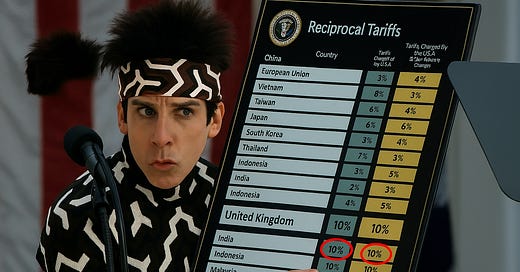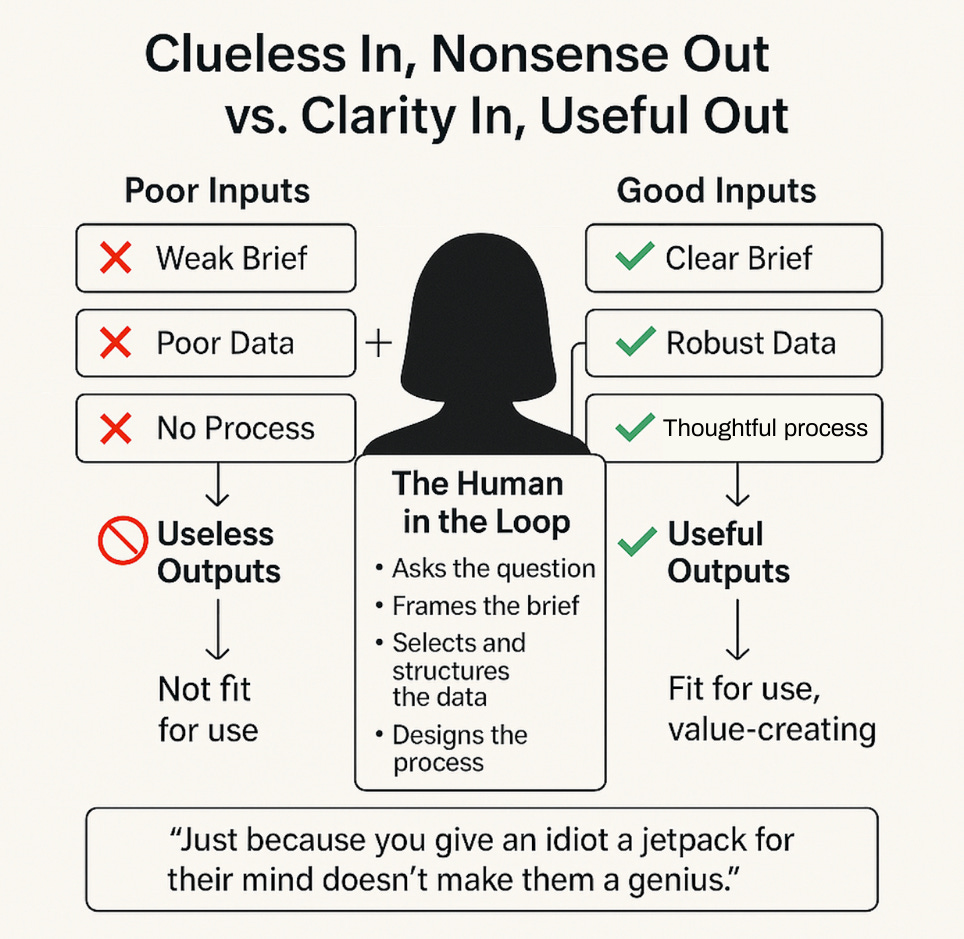Antonym: The Idiot With the Jet-Pack Edition
Just because you think fast, don't mean you think good too.
Dear Reader
It happened faster than anyone expected - some fool actually used AI as a weapon of massive economic destruction…
While safety teams at companies like Anthropic spend countless hours gaming out nightmare scenarios - bioweapons, cyber attacks, infrastructure sabotage - no one imagined this particular disaster: a group of ideological zealots seize control of the world's largest economy and use AI tools like ChatGPT to put their misguided and impossibly complex tariff schemes into action.
Just because you give an idiot a jet pack for their mind, doesn’t make them a genius.
Dominic Preston of The Verge explains the detail behind the tariffs by LLM fandango:
A number of X users have realized that if you ask ChatGPT, Gemini, Claude, or Grok for an “easy” way to solve trade deficits and put the US on “an even playing field”, they’ll give you a version of this “deficit divided by exports” formula with remarkable consistency. The Verge tested this with the phrasing used in those posts, as well as a question based more closely on the government’s language, asking chatbots for “an easy way for the US to calculate tariffs that should be imposed on other countries to balance bilateral trade deficits between the US and each of its trading partners, with the goal of driving bilateral trade deficits to zero.” All four platforms gave us the same fundamental suggestion.
Think of this SNAFU in terms of the Data-Process-Output model for working with AI we talked about in Antonym two weeks ago: if there’s poor data and poor process and a poorly qualified human-in-the-loop judging the answers, then the outputs are likely to be poor.
The better scenario would be: A team of international trade policy experts and economists gathered all the necessary policy and trade data, then mapped a step by step process to solve the problem of what tariffs to apply to what country they might have then used AI and got a consistent, logical and possibly useful result. The overall policy may have still been a mistake, but it would have been better thought through and they wouldn’t have revealed the underlying careless workings out.
Fun fact: The US tariff policy is also uncannily explained in Ferris Bueller. I knew that no one listening in class was the joke. I hadn’t realised we were waiting until this week for the punchline…
The Trouble with Taste: Why Knowing Good from Rubbish Still Matters
Thanks to the current band of West Wing geniuses, I’ve a slightly more dramatic example of jet-pack mind without the knowledge or context to guide it.
Previously, I used this one: So you’ve generated a marketing campaign with AI. Congratulations. But tell me this: is it any good?
That was the question I put to a smart business leader, newly enthralled by the wizardry of large language models, had decided they no longer needed agencies or specialists. “We can just do it ourselves now,” they said. “Plan it, write it, launch it.” They were right, of course. They could. But the problem wasn’t capability. It was judgement. Would they even know if what they’d made was any good or utter rubbish?
And that’s where taste comes in.
Taste isn’t a flair or a flourish. It’s not decoration. It’s discernment. It’s what tells you that something’s right – or slightly off. It’s what saves you from approving the tone-deaf headline, the clunky layout, the wrong socks at a funeral. It’s what tells you that, while the AI output may be technically passable, it’s also depressingly forgettable.
Taste isn’t innate. You develop it – over years, usually without noticing. It’s what grows in the soil of your subconscious, fed by the books you read, the art you see, the people you listen to. It comes from caring enough, often enough, to learn the difference between good and great, stylish and try-hard, sharp and hollow.
It’s deeply personal – but also profoundly social. Your taste reflects your influences, your environment, the communities you move through. What you admire. What you’ve bothered to understand. It’s a muscle that gets stronger the more you use it – and lazier the more you outsource it.
We have tastes in everything: food, fashion, furniture, fonts. We have aesthetic instincts, preferences, sensibilities. And in creative work, taste is often what makes the real difference. Two people can use the same tools, but only one of them will know when to stop, what to cut, how to polish.
In that way, taste isn’t unlike a model. A culture model. A trained internal reference system that helps us make decisions – what fits, what works, what to do next. If you like, you could even stretch the metaphor and say that our taste is our model, and our judgement is our knowledge graph: the internal wiring that tells us when to activate which instinct, and why.
AI has models. So do we. But the difference is in the training.
AI is trained on everything. You’re trained on what matters – to you, to your audience, to the context you’re operating in. AI can generate endless content. But it can’t tell you what’s worth keeping.
Taste can.
So use the tools. Generate the drafts. See what comes out. But don’t abandon the agency, the specialists, the humans whose job is not just to do, but to know. Because in a world of infinite output, knowing good from rubbish is the most underrated superpower of all.
Bonus simulated Antonym Edition (there are actually some good stories in here too)
It's sometimes implied that I write this letter using AI, but that would defeat the purpose for me. It’s a place to think through things that have been on my mind that week.
Here, however, is a state of the art AI Agent version of this week’s newsletter, creating the insanely powerful Manus system, with my learned colleague Dr Jason Ryan at the controls. He created a news aggregator focused on AI and then had Manus choose stories, write them up in my style and illustrate them.
The results are so fascinating I’m slightly nervous to share them. Luckily I’m the boss of this newsletter and no one can replace me unless I want them to. The more observant reader will notice that the agent has been overly influenced by the last couple of weeks’ editions of Antonym, shown in the repetition of the opening line “I was right in the morning…” etc and its predilection for robotic animal illustrations.
Tastes like taste
And now back to the humanity…
“The way that we perceive the world involves condensing information and compressing information. And I think looking at art is training for taking in the full beauty and chaos of the world around us.”
– Lauren Mechling, ‘I Felt Like an FBI Agent’: The Author Who Infiltrated the Art World
Taste is something you grow, deep inside your sub-conscious mind. You might be conscious of it – have created perceptual habits through disciplined practice, or you might have picked up the habits of mind by chance, by dint of who and where you spend formative years.
Your taste is yours, but it has been fed by others, by the groups of people you know, the things you have put your attention into, day by day week by week.
We can have tastes – for different domains as well as our different senses. An aesthetic, a knowing which to choose when, an instinct for what will work and what won’t. Your taste manifests in decisions and choices.
Taste may be the thing that is closest to Large Language Models in our mind. Culture models, really, an inner reference for what a thing may be and where it may fit with things. Some taste models may be simple and functional: not that suit for that meeting, not those socks for that funeral.
Computationally we might think of our tastes as our models and our judgements as our knowledge graphs – our rules of when to activate one and not another.
That’s all for this week, folks…
See you all in a week I hope. Should be an interesting week..
Antony











That Ferris Bueller vid is 😂
I love your posts Antony. Clever without being impenetrable! You’ve got a brilliantly cerebral mind, but the way you write makes the complex stuff surprisingly easy to follow for someone like me, thanks!
I also wrote about judgement and taste last week, but nowhere near as eloquently!